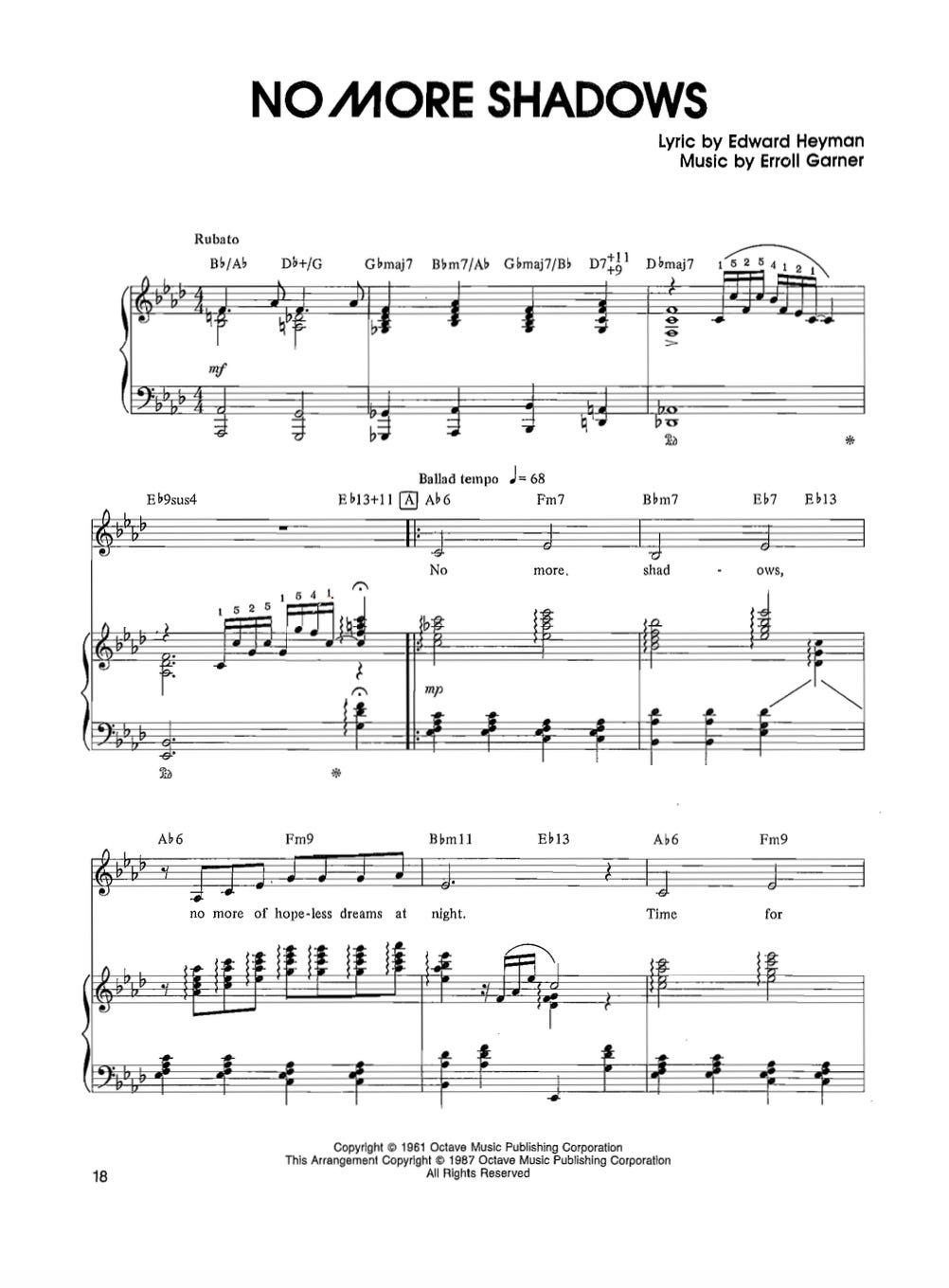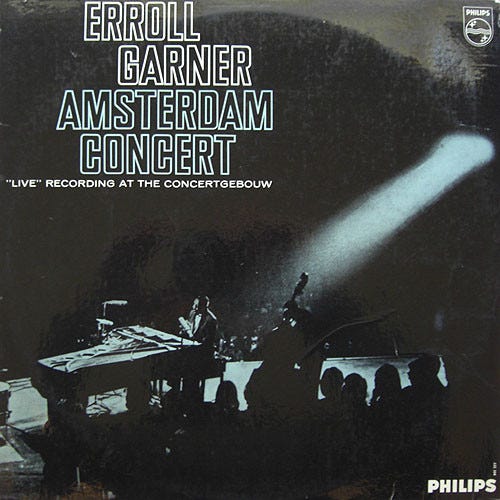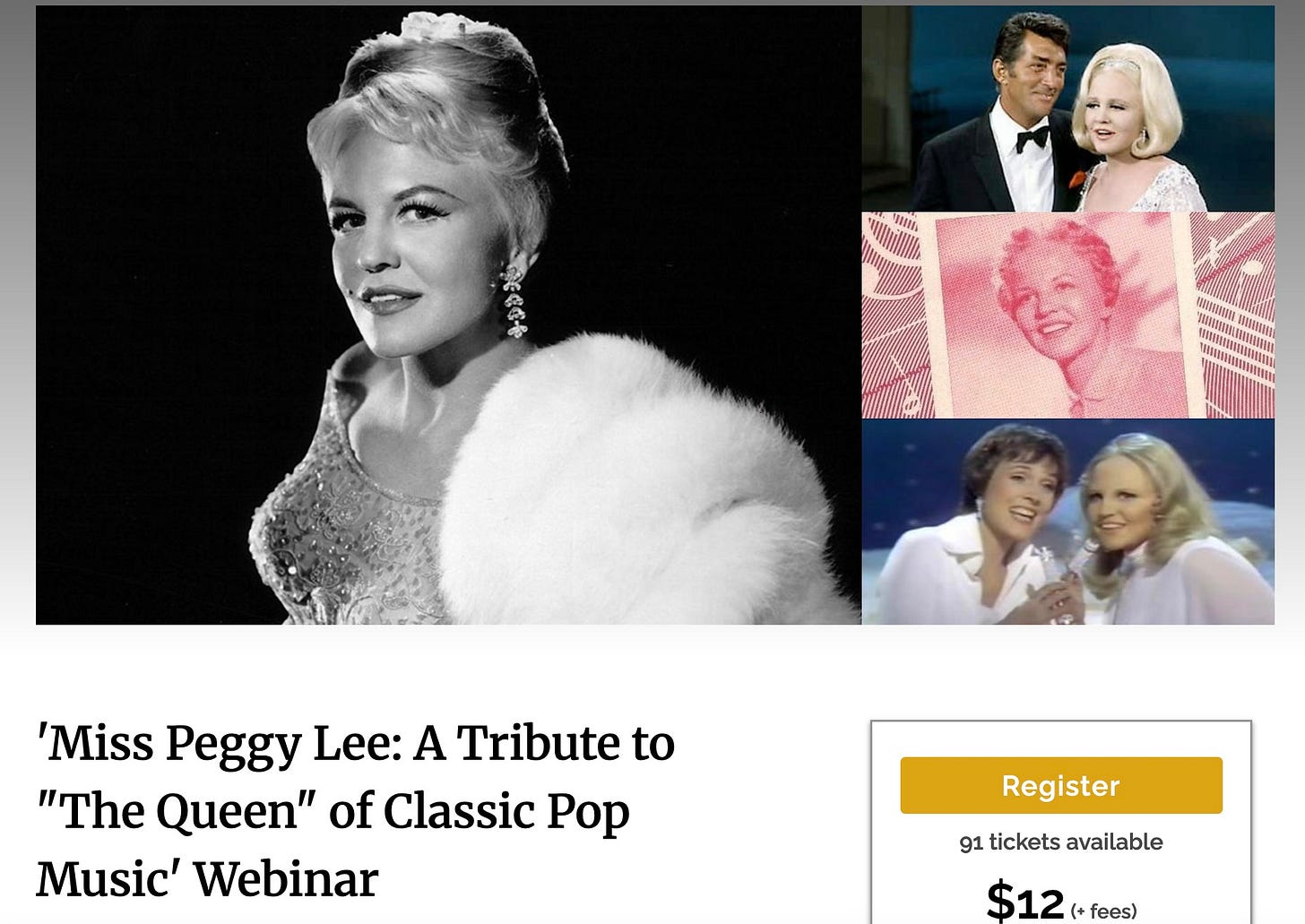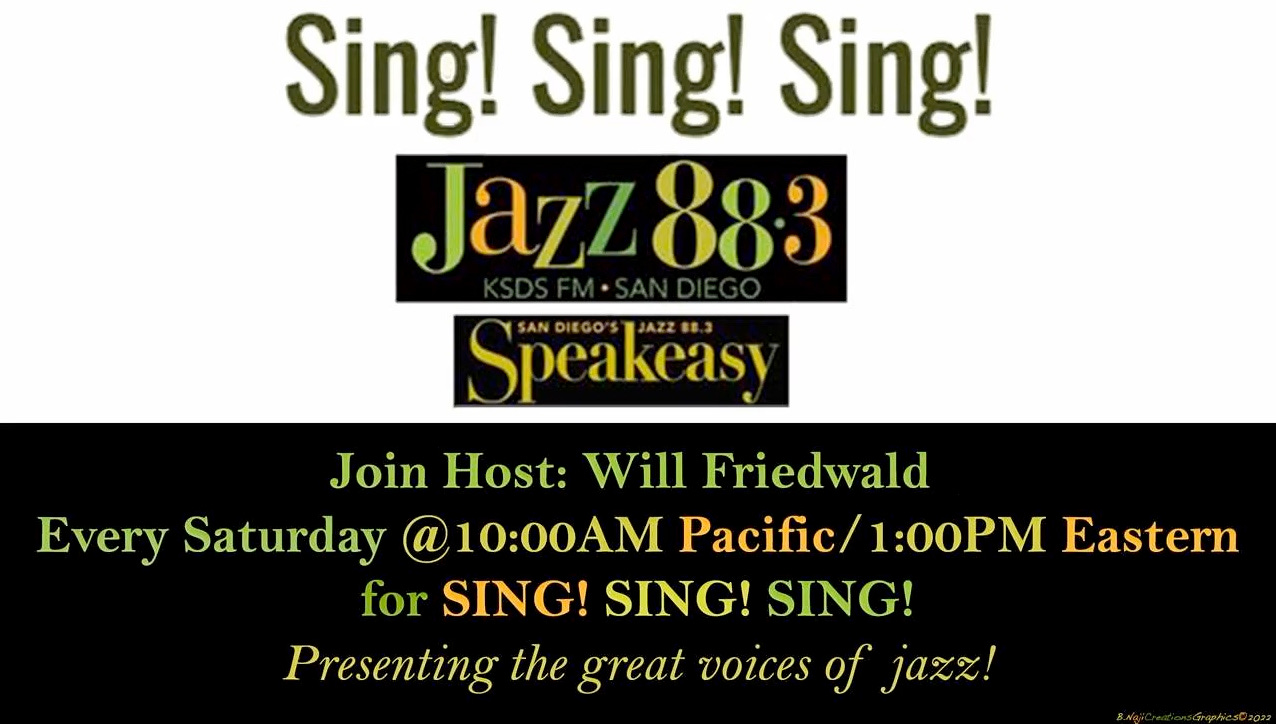Seth MacFarlane, Frank Sinatra, & Erroll Garner: “Shadows”
A Special Bulletin from The Frank Tank
Very special Thanks to the all knowing and all-wise Rob Waldman as well as three guys named Michael - Michael Lavine, Prof. Michael G. Garber, and Michael “Contentious” Kraus - for helping me to research and report this story.
The collective group of hardcore music nerds that I call “The Frank Tank” (closely connected to “The Nat Pack”) is understandably all a-twitter over the brand new Seth MacFarlane album, Lush Life: The Lost Sinatra Arrangements. I have a full review - which I reluctantly had to trim down from 1200 words to the usual 800 - coming in the Wall Street Journal, but here is the first in a series of more specific side observations.
Calling the new album Lush Life makes sense: this is the Sinatra track that is most famous for being “lost,” although that may not be exactly the right word. Sinatra recorded an incomplete version in 1958 for his masterpiece album Only the Lonely, and that fragment has long circulated amongst collectors and Frank-Tankers, before finally being officially issued on the 60th Anniversary Edition of Only the Lonely in 2018. It was also recorded in 2019 by Calabria Foti, an excellent contemporary singer (and violinist) based in Los Angeles. (Here is the officially-released version of the Sinatra incomplete take, as well as a mini-documentary on Ms. Foti’s recording.)
As I say in the Journal story, the Sinatra “Lush Life” is far more of a fascinating misfire than a lost masterpiece. Both Ms. Foti’s and Mr. MacFarlane’s recordings are certainly well worth hearing, even if the total weight of the evidence leads to the inevitable conclusion that Sinatra made the correct decision to abort - that neither the song nor Nelson Riddle’s chart (for once) were precisely right for him.
While it’s good to hear this “Lush Life” as properly recorded by a baritone in Sinatra’s general sonic sphere, there are other charts here that are much more of a revelation - and the most amazing of these is the album’s closer, “Shadows.”
“Shadows” was known to have been arranged by Riddle for the Moonlight Sinatra album - recorded on November 29 and 30, 1965. This was a particularly crucial moment in Sinatra’s career, his major TV special, Frank Sinatra: A Man and his Music, was aired on November 24, and the double-album retrospective package was also released. The big fiftieth birthday would be on December 12 and the iconic engagement with Count Basie in Las Vegas - which would ultimately result in the classic Sinatra at the Sands album - would begin on January 9, 1966.
That, however, is all that was known about “Shadows” - other than that it’s a beautiful arrangement of a lovely melody; of the major components of the song, the text might be said to be the weakest. Sinatra eventually - and diplomatically - nixed it for the Moonlight album using the acceptable excuse that, although the moon is mentioned twice in the text, the song isn’t explicitly lunar-centric.
Timing-wise, it would have probably fit on the LP, which is, as released, is ten songs and 32 minutes. But in the Sinatra tradition of concept albums, usually the only new song on an album of standards is the title song (and sometimes an ending song): “Come Fly With Me,” “Strangers in the Night,” “Nice and Easy,” etc. So, “Shadows” would have been an outlier on Moonlight Sinatra for two different reasons.
“Shadows” - aka “No More Shadows” was written by Erroll Garner, one of the all-time great jazz pianists, who was, along with Nat Cole, Oscar Peterson, and George Shearing, a personal favorite of Sinatra’s. In addition to a 30-year-career as one of the most beloved and popular pianists in all of American music - easily on a par with Dave Brubeck, George Shearing, or Ahmad Jamal - Garner is also known to the larger world of American popular music for one major hit and standard as a songwriter. He originally recorded his instrumental ballad, which he had the foresight to title “Misty,” with his trio in 1954. By 1956, the song was popular enough for him to cut a new version, this time with a full string orchestra arranged by Nat Pierce and conducted by Mitch Miller.
Lyrics were added by Johnny Burke - in his post-Jimmy Van Heusen phase - around 1957. Dakota Staton seems to have been the first to record the vocal version in 1958, followed a few months later by Sarah Vaughan (in her classic album Vaughan with Violins, produced and conducted by Quincy Jones in Paris in July 1958) and then the hit version by Johnny Mathis on his best-selling album Heavenly in 1959. Both Vaughan and Mr. Mathis made it into a signature song, with Sarah in particular singing it live at hundreds of concerts over the decades. Along with “What’s New” by the veteran bassist Bob Haggart - which also had lyrics by Johnny Burke - “Misty” was quite possibly the best known song ever composed by a jazz musician other than Duke Ellington or Billy Strayhorn.
Martha Glaser, Erroll’s very aggressive - I know this from personal experience - personal manager, was always looking for the possibility of another “Misty,” but, as far as I can tell, the only other Garner song to receive a set of lyrics was “Dreamy,” in which a decidedly lesser text was written by an obscure songwriter named Sidney Shaw. Sarah Vaughan not only recorded “Dreamy,” but she made it the title track of a lovely ballad album in 1961 (see below) - even so, the song never caught on and has scarcely been heard from again.
Sinatra had long been a fan of Garner; there’s an anecdote, which sounds highly likely but which I haven’t been able to verify, that he loved Garner’s big band instrumental version of “Misty” until he realized that it had been produced and conducted by his bearded nemesis, Mitch Miller. In 1961, Sinatra included “Misty” on his classic first collaboration with arranger Don Costa, Sinatra and Strings.
In 1963, Sinatra made a concerted attempt to secure Garner’s recording contract for his own label, Reprise Records. (More irony: I knew the late Ms. Glaser for many years but I never thought to ask her about Sinatra.) Billboard announced on March 2 of that year that Garner was signing to “the Frank Sinatra label,” which ultimately amounted to an agreement between Garner’s production company, Octave Music, and Sinatra’s Reprise. The agreement resulted in one excellent album, One World Concert, which had already been taped the previous August at the Seattle World’s Fair. It would be released on Reprise later in 1963, but when One World failed to sell as well as Garner’s classic Concert by the Sea, One World would be Garner’s first and last album for Reprise. (Below is Garner’s brilliant version of Jerome Kern’s “The Way You Look Tonight” from One World Concert, which may well have inspired the iconic Sinatra-Riddle version of a few months later.)
Garner introduced his ballad “Shadows” on his 1961 studio album Closeup in Swing. in 1964, he played “Shadows” at the Amsterdam Concertgebouw; roughly half of that performance was issued in 1966 on the album Amsterdam Concert, and the other half in 2018 on a new package of previously unheard Garner material titled Nightconcert. And that more recent release included a far superior, extended version of “Shadows.”
There’s one more live version, performed in London on the excellent BBC TV series Jazz 625 in 1964:
Martha Glaser thought enough of “Shadows” to commission a lyric, not from Sidney Shaw or Johnny Burke, who was increasingly incapacitated by his alcoholism in the early 1960s, but from the venerated songwriter Edward Heyman. Heyman retitled the song “Shadows No More” and apparently Martha got the song to Sinatra, who was always receptive to the idea of a new song by “The Elf” as the diminutive piano virtuoso was known. Sinatra went as far to include this song, along with ten standards, in a proposed list for the album eventually titled Moonlight Sinatra, one of his final masterpiece collaborations with the great Nelson Riddle.
We believe that he dropped the song even before he got into the studio, because, among other reasons, the song is insufficiently moon-y. But also, Heyman’s lyric is far from his best - not in the same league as “Blame It on My Youth,” “I Cover the Waterfront,” - two songs recorded magnificently by Sinatra - or the King Cole classic “When I Fall in Love.” (“Body and Soul,” although probably Heyman’s most famous song, also, for reasons I go into at length elsewhere, doesn’t represent his best writing, either.) This is the version that Seth sings on his new Lush Life album.

Apparently, Martha wasn’t happy with the song either and asked Heyman to go back to the drawing board. (Knowing her as I did, I have no difficulty believing that she would have had the chutzpah to make such a demand of a legendary songwriter.) Thus the song has a second set of lyrics, also by Edward Heyman, and alas, these new lyrics aren’t particularly great either. As Sinatra would have said, ‘It’s a very pretty melody, but no one went out and got drunk over the words.” This second lyric was published, both independently and in one of the Garner songbook collections, but I don’t know of any performance of it by anybody. (Maybe Seth will come back to it and sing this second lyric sometime in concert - now there’s a fun thought.)
(Below the copyright / publishing data, unearthed by Michael Garber: three versions, one instrumental, two with different sets of lyrics by Edward Heyman.)
Post-script: Garner and Sinatra remained close. In January 1966, a few weeks after the Moonlight Sinatra sessions, Sinatra was in the middle of his landmark gig and live recording session with Quincy Jones, Count Basie, and the Orchestra - part of what became Sinatra at The Sands. Approaching the end of the set, he introduces a few celebrity musicians in the house - “It looks like an arranger’s convention” - first Johnny Mandel (keep watching this substack for a story on the unrecorded Sinatra-Riddle version of “The Shadow of Your Smile”) and then Don Costa, whose Italian-American background inspires a digression into ethnic humor in which Sinatra referencing himself and Costa as “Wop-ahoe” Indians, a says, “those other guys are “Nava-Jews!”
He then he starts to introduce Garner, who is so short that Sinatra (no giant himself) has a hard time spotting him in the crowd. “Now somewhere in this room, there’s a very old buddy of mine….” He introduces The Elf as “old hammer and tongs” - presumably a reference to the hammers in the internal workings of a piano - and then says, apparently to either pianist Bill Miller - or possibly Basie himself - “He growls louder than you do!” Which is true; Garner was known for the non-verbal noises he made during his solos. And from there he goes on to introduce Quincy, Basie, and Miller - vaguely hinting at a somewhat off-color pun on the word “pianist.” Then there’s more ethnic humor when he refers to himself and Miller as being the “only ofay cats” on the stage, using a now-archaic African-American slang term for white people ( “foe” = “ofay” in pig Latin). Whenever he engaged in humor that drew on racial and religious groups, Sinatra would invariably also make a few even more equivocal and self-deprecating comments about Italian-Americans; apparently the rule for such humor was that it was essentially okay as long as he made a point to also throw himself under the bus in the process. (Below, the full “Introductions” point from the second disc of the 2006 Sinatra Vegas box, followed by a second video that cuts directly to the point where Sinatra introduces Garner.)
(Very special thanks to Elizabeth Zimmer & Dan Fortune for their expert proofing, hey!)
Coming on Wednesday June 11 @ 7:00PM, THE NEW YORK ADVENTURE CLUB presents MISS PEGGY LEE: THE QUEEN OF POP MUSIC webinar (All presentations are available for replay viewing for one week after the live event. For more information & reservations, please click here.)
Sing! Sing! Sing! : My tagline is, “Celebrating the great jazz - and jazz-adjacent - singers, as well as the composers, lyricists, arrangers, soloists, and sidemen, who help to make them great.”
A production of KSDS heard Saturdays at 10:00 AM Pacific; 1:00 PM Eastern.
To listen to KSDS via the internet (current and recent shows are available for streaming) click here.
The whole series is also listenable on Podbean.com; click here.
SING! SING! SING!
Let's Spring One! (Sing Sing Sing goes Spring Spring Spring!)
(SSS #149 2025-05-24 - Spring 2025, Part 2)
download: <or> play online:
The Charles Strouse Jazz & Pop Mixtape (RIP 1928-2025)
(SSS #062 2023-09-02)
download: <or> play online:
Mother's Day - Mama I Wanna Make Rhythm!
(SSS #148 2025-05-17)
download: <or> play online:
Cinco de Mayo 2025 - Swinging Singers Go Latin!
(SSS #147 2025-05-10)
download: <or> play online:
SLOUCHING TOWARDS BIRDLAND is a Substack newsletter by Will Friedwald. The best way to support my work is with a paid subscription, for which I am asking either $5 a month or $50 per year. Thank you for considering. (Thanks as always to Arlen Schumer for special graphics.) Word up, peace out, go forth and sin no more! (And always remember: “A man is born, but he’s no good no how, without a song.”)
Note to friends: a lot of you respond to my Substack posts here directly to me via eMail. It’s actually a lot more beneficial to me if you go to the Substack web page and put your responses down as a “comment.” This helps me “drive traffic” and all that other social media stuff. If you look a tiny bit down from this text, you will see three buttons, one of which is “comment.” Just hit that one, hey. Thanks!j
Slouching Towards Birdland (Will Friedwald's Substack) is a reader-supported publication. To receive new posts and support my work, consider becoming a free or paid subscriber.










from Daniel Weintstein - re Sinatra's reference to "hammer and tongs" :
Sinatra's characterization of Garner's left hand, which he proceeds to illustrate verbally, compares the 4 beat left hand chording Garner would sometimes use with the beating of a blacksmith, who would use the tools of hammer and tongs. Think "The Anvil Chorus," which somewhat resembles a slow stride left hand piano style (bass-chord-bass-chord on the 4 beats.)
WF: I just remembered: it's in an early song recorded by Johnny Mercer (but credited to Dick McDonough) - "Dr. Heckle and Mr. Jibe" - (although I wouldn't be surprised if Mercer actually wrote the words, and just left his name off for publishing reasons or something like that):
anyhow, the bridge goes:
When there’s room for argument
Get out them hammer and tongs
They don’t know from nothin’, so
They always wind up kickin’ gongs
ah ha!
w
When it comes to "Lush Life," you can have your Sinatras, Fitzgeralds and Stewie Griffens, but when push comes to shove, I'm throwing in with Nat.
https://youtu.be/fCrCiMJOmWk?si=-XELcSRgsvT8TNo7